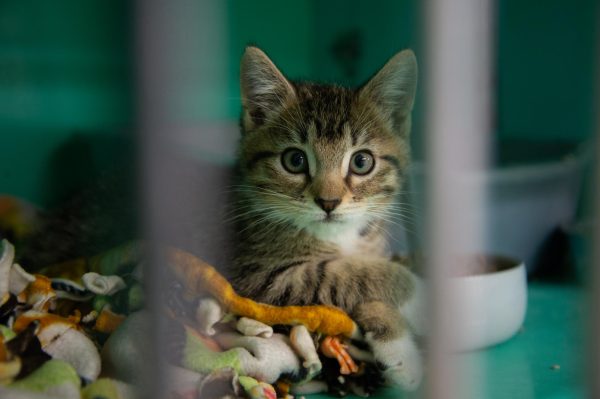Pet’s mental health may impact owners
Owning an ill dog can cause owner to feel intense grief, stress
MICHAEL LINDER | DAILY EVERGREEN FILE
Zoey, a Mini Australian Shepard, plays a game of fetch with her owner, Michael Linder. The bond between humans and their pets can cause separation anxiety.
March 7, 2018
Dogs get sick with many of the same illnesses that affect people, including mental disorders. A pet’s illness can then cause chaos in an owner’s life.
Phyllis Erdman, professor of counseling psychology, was a former chairperson of the American Psychological Association’s Human-Animal Interaction section. She said a dog’s illness can affect an owner even more than if a family member gets sick because of how often the dog and owner interact.
Clinical Instructor Leticia Fanucchi runs WSU’s Veterinary Teaching Hospital behavioral specialty and said her job involves behavior medicine and treating behavior cases in dogs. She works with dogs suffering from mental disorders and their owners.
She said owning a dog with a mental disorder can have a negative impact on an owner’s life because it can cause environmental changes and disruptions in family relationships.
Fanucchi was inspired by her own dog to get into this line of work.
“I had [a] dog that had separation anxiety and there was no help,” Fanucchi said. “There were not too many behaviorists available.”
Fanucchi said she’s encountered couples with marital issues resulting from their dog’s mental disorders. She said this can happen when one person favors the pet or excuses its bad behavior.
Another issue people experience with their dog is biting, especially if it bites a child. Fanucchi said some owners decide to rehome or euthanize their dog if they bite a child, which results in emotional distress for the person who has to make that decision.
Fanucchi said she has clients who have been hospitalized due to bites from their pet, but still can’t find it in their heart to let the pet go.
Fanucchi discussed dogs having conflicts with owners, but also instances where conflict occurs with other animals. She said owners can experience stress if they have multiple pets who fight often and have to be split up.
Owners may be put into a position of choosing one pet instead of another. Fanucchi said this is particularly difficult if there are multiple owners and they favor different pets.
If problems persist and owners have to get rid of their pet, they may feel grief. Erdman said she noticed that a person with a sick or recently deceased pet feels disenfranchised because some people don’t understand their grief is the same as when a family member is ill.
Before rehoming a pet, owners may seek treatment of both the dog’s mental disorder and poor behavioral patterns.
Fanucchi said treatment for behavior improvement includes three components: behavior modification, where bad behavior is trained to be replaced with good behavior; environmental management, where the dog’s environment can be altered to ensure it’s appropriate and promoting of the dog’s success; and, if necessary, giving an especially anxious animal medicine.
“If we don’t treat the anxiety, we don’t see progress in anything else,” Fanucchi said. “We can fix the environment, we can teach them to do something different, but if their brains are not equipped to do that, then no amount of training will fix a dog that has a mental disorder.”
Fanucchi said treatment starts with a two-hour consultation between her, the owner and the dog. They go over a 10-page questionnaire, which she uses to help her understand what is going on. The next step is diagnosing the dog, recommending treatment and teaching the owner how to train the dog.
She then schedules a second appointment to see if the treatment seems effective or needs to be adjusted. She said these two appointments are normally enough, but sometimes it takes more.
“What we do is … fix the human-animal bond,” Fanucchi said, “by working with the humans in order to treat the pets.”






















